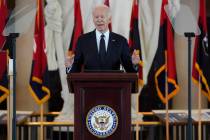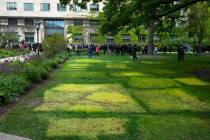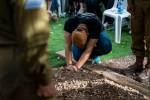Army medicine: a compelling career choice for all life stages
The U.S. Army has one of the largest comprehensive systems of health care in the country and offers physicians the chance to provide high-quality patient care without concern about the business side of running a practice. Army physicians often practice in diverse environments - from large hospitals in major American cities to rural clinics in third-world countries. These opportunities help expand their professional and leadership skills, regardless of where their careers take them.
Biology lab to basic training
When student Allyson Fewell decided on a career in medicine, it was because she knew she wanted to interact with people and serve humanity - two things she felt she could not achieve working only in a lab.
But funding medical school presented a serious challenge. "I knew I didn't want to take on $150,000 in debt. Then I heard that I should learn more about the opportunities in military medicine," says Fewell. "Both my grandfathers served in World War II and their experience sparked my interest in exploring the Army."
The Army's F. Edward Hebert Armed Forces Health Professions Scholarship Program (HPSP) and loan repayment helps defray the cost of medical school, and financial rewards can exceed what professionals in some areas will earn in the private sector.
After speaking with many people who also took the military route, Fewell learned the Army would pay for her tuition and provide her with a living allowance. In exchange, she would give four years of service, with the option of staying on after she met the service requirement. The call to service and her patriotism were two very important, intangible reasons she joined the U.S. Army Medical Corps.
Now a captain in the Army and chief of medical residents at Brooke Army Medical Center in San Antonio, Fewell credits her success to all of the teachers, mentors and leaders who opened doors and helped her find the right career fit.
Last year, Fewell traveled to Haiti with a group of volunteer military doctors after the earthquakes there devastated much of the country.
Achieving a lifelong dream at 60
Not every career path is a straightforward one. In 1984, at age 34, Dr. Dore Gilbert, a dermatologist in Orange County, Calif., was in serious discussions with a recruiter about joining the Army Medical Corps.
But with young children and an established medical practice, he just couldn't sign on the dotted line. Instead, he channeled his desire to be of service by sitting on his local school board for many years.
Years later, with all five of his kids out of college, his youngest joined the Marines and renewed Dr. Gilbert's interest in the Army. At age 60, he finally joined the Army Reserve.
"The camaraderie is the draw - and the sense of doing something important," says Gilbert. "It gives me the opportunity to help young men and women who are the best of the best. And being a reserve officer allows me to keep my practice."
He received the rank of lieutenant colonel because of his years of clinical practice and quickly began training to pass physical training requirements (27 sit-ups in two minutes, 18 push-ups in two minutes and running two miles in 19 minutes, 54 seconds). Surprising even himself, he surpassed each of these necessary benchmarks and began blogging about his experiences on an Army website, www.ArmyStrongStories.com.
After six months back home, serving one weekend a month, now it's off to Afghanistan. Gilbert's three-and-a-half month assignment overseas is to stabilize wounded Soldiers while they wait for surgeons. His experience as a dermatologist will also help Soldiers return to the field faster as they will no longer need to travel to Germany for skin treatments he can address on site.
"It's a very high tempo base, and supporting the thousands of soldiers in the brigade is exactly what I want to be doing at this stage in my career. The Army Reserve allows me to gain these great new experiences and do something meaningful while knowing my practice is covered until I return home," says Gilbert. "And, according to the general, I am the oldest soldier in the brigade."
Dynamic career, meaningful work
An Army medical career offers a variety of financial incentives and benefits, including medical scholarships, loan repayment, internship programs and financial assistance to medical residents and postgraduate students. For example, students training to be Army physicians receive a monthly stipend of $2,088 to help cover living expenses during medical school.
For more information about careers, incentives and benefits, visit www.goarmy.com/amedd.























